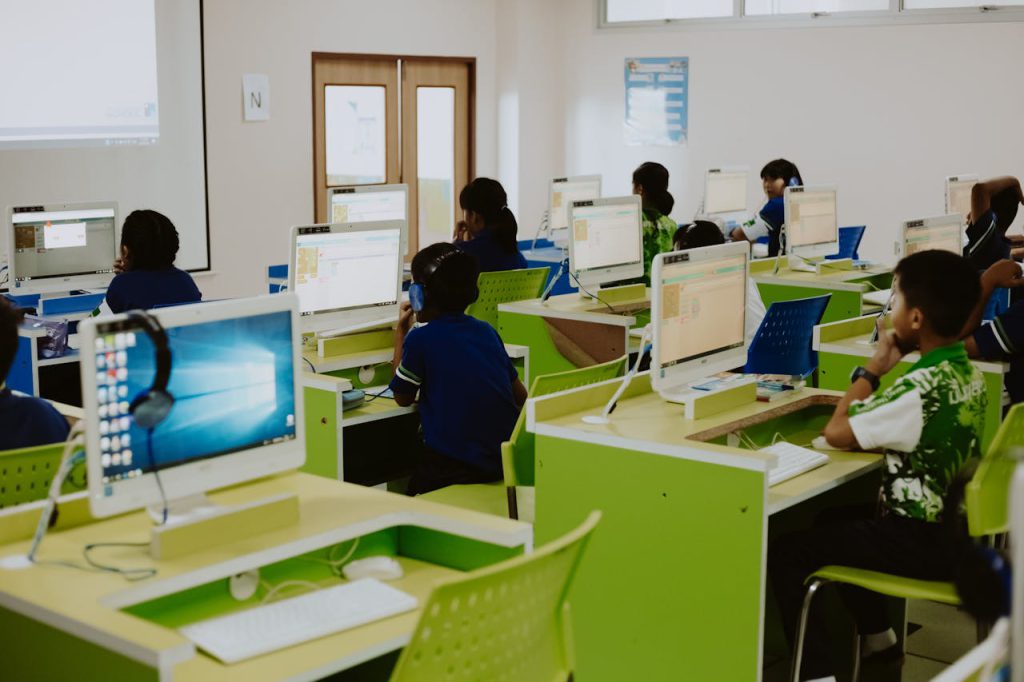
Tips for Managing Screen Time for School Children of All Ages
Every day, children spend hours on tablets, smartphones, and computers, whether for online classes, homework, or entertainment. For parents, it can be challenging to know how much screen time is appropriate and how to ensure that technology supports learning rather than distracting from it. Finding the right balance is key to nurturing healthy screen habits and supporting a child’s overall development.
At St. Prayag Public School, we focus on helping students achieve a digital balance while encouraging academic growth and personal wellbeing. Here are practical tips for parents and guardians to manage screen time for students of all ages.
Understanding Screen Time by Age Group
Not all screen time affects children the same way. Age-appropriate guidelines can help parents set limits:
- Primary School Children (Ages 5–10): Limit recreational screen use to 1–2 hours a day. Encourage educational apps and interactive content under supervision.
- Middle School Children (Ages 11–13): Introduce structured screen schedules for learning and recreation. Teach children basic self-regulation techniques.
- Secondary Students (Ages 14–18): Focus on purposeful screen use for research, learning, and skill development. Encourage self-monitoring to prevent excessive recreational use.
The Impact of Excessive Screen Time
Too much screen time for students can affect physical health, mental wellbeing, and academic performance. Some common concerns include:
- Physical Health: Eye strain, headaches, poor posture, and disturbed sleep.
- Mental Wellbeing: Increased anxiety, irritability, and reduced attention span.
- Academic Performance: Procrastination, distractions, and reduced focus on studies.
Parents may notice their child struggling to engage in offline activities, staying up late on devices, or losing interest in hobbies. These are signs it may be time to reassess their screen habits.
Smart Strategies to Manage Screen Time
- Create a Family Screen Time Schedule
Set clear boundaries for study, recreation, and rest. Include daily “tech-free” periods for family meals and conversations to encourage healthy routines.
- Encourage Offline Activities
Promote reading, outdoor games, and creative hobbies. Offline activities help students develop social, emotional, and cognitive skills while reducing dependency on screens.
- Use Parental Controls Wisely
Monitor apps, games, and online content to ensure safe and age-appropriate usage. Screen time tracking tools can help students learn responsibility while respecting their independence.
- Model Balanced Screen Habits
Children follow their parents’ examples. Limiting your own screen use and practicing mindful digital habits encourages students to adopt healthy routines naturally.
- Make Screen Time Purposeful
Focus on educational, creative, and skill-building content rather than passive scrolling. Purposeful screen time enhances learning while supporting healthy digital habits.
School’s Role in Promoting Digital Discipline
At St. Prayag Public School, digital learning is carefully balanced with offline activities. Our approach includes:
- Smart classrooms with structured use of technology
- Digital wellness sessions for students
- Projects that combine online research with hands-on learning
We partner with parents to guide students toward responsible digital use and ensure a balanced approach to education.
Signs Your Child May Need a Screen Time Reset
Parents should look out for:
- Mood swings or irritability
- Difficulty sleeping
- Declining grades or focus
- Lack of interest in offline hobbies
Early intervention through structured schedules, offline activities, and open communication can help students develop better screen habits.
Practical Screen-Free Family Ideas
- Family reading nights to encourage storytelling and discussion
- Outdoor weekend activities in Pitampura to stay active
- Creative DIY projects that involve art, music, or teamwork
These activities help children enjoy quality family time, foster creativity, and maintain a healthy balance between screen and non-screen activities.
Conclusion
Managing screen time for students is not about strict restrictions but about balance, discipline, and mindful use. Parents play a crucial role in guiding children toward productive screen habits while encouraging offline growth.
At St. Prayag Public School, we nurture students to be digitally responsible, academically focused, and emotionally balanced. With the right guidance, children can enjoy the benefits of technology while thriving in every aspect of life. Choosing the best school in Pitampura ensures your child receives the support they need to develop lifelong healthy screen habits.